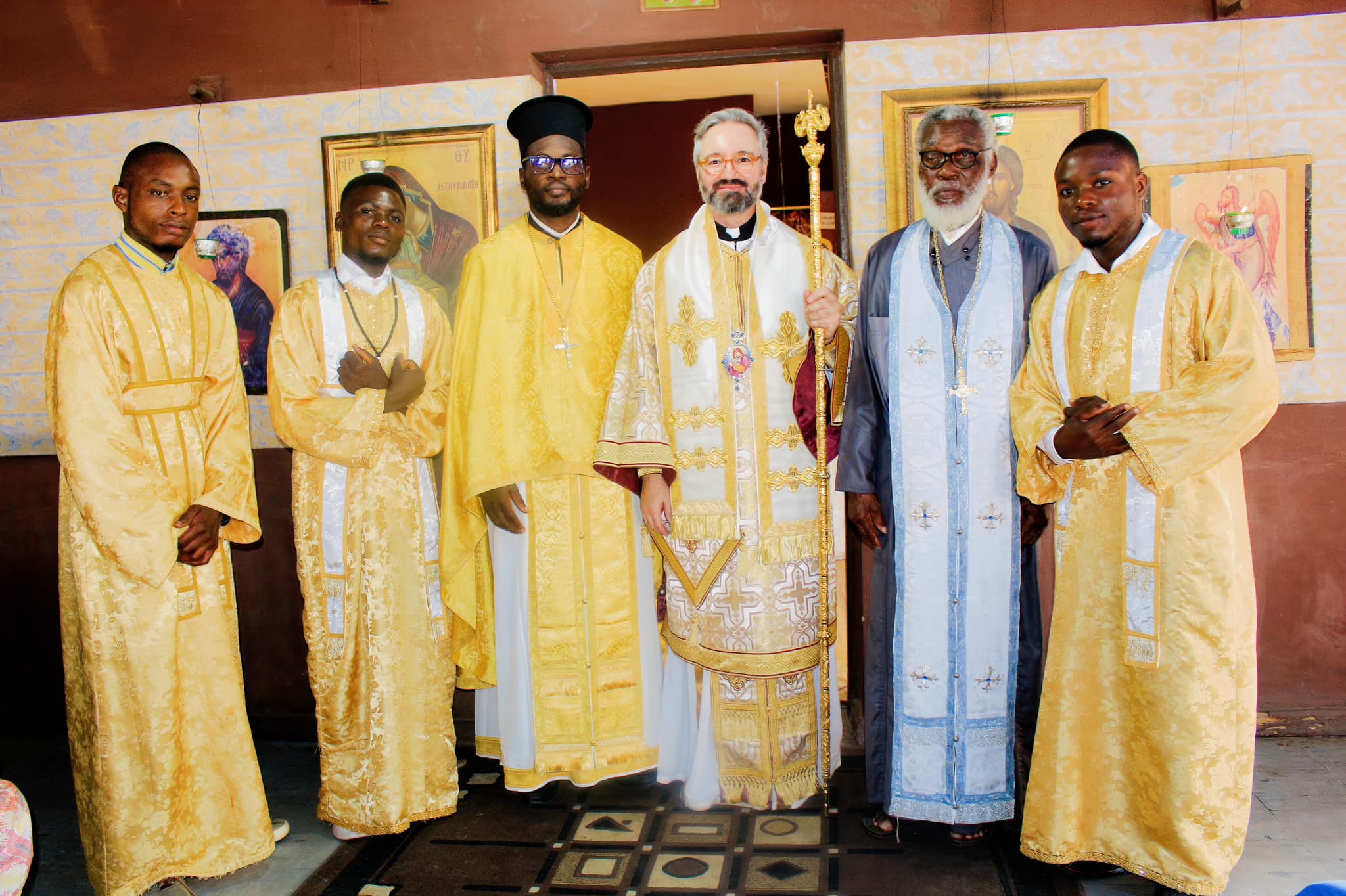Martyr Boniface of Tarsus in Cilicia, and Righteous Aglaϊa of Rome (19 December)


The Holy Martyr Boniface was the slave of a rich young Roman woman named Aglaϊa, and he lived with her in iniquitous cohabitation. Both, however, felt the sting of conscience and they wanted to be cleansed of their sin somehow. The Lord granted them the possibility to wash away their sin with their blood and to finish their life in repentance.
Aglaϊa learned that whoever keeps relics of the Holy Martyrs in their home,and venerates them, receives great help in gaining salvation. Through their influence, sin is diminished and virtue prevails. She arranged for Boniface to go to the East, where there was a fierce persecution against Christians, and she asked him to bring back the relics of some Martyr, who would become their guide and protector.
As he was leaving, Boniface laughed and asked, “My lady, if I do not find any relics, and if I myself suffer for Christ, would you accept my relics with reverence?”
Aglaϊa scolded him, saying that he was setting off on a sacred mission, but he was not taking it seriously. Boniface pondered her words, and during the whole journey he thought that he was not worthy to touch the relics of the Martyrs.
Arriving at Tarsus in Cilicia, Boniface left his companions at the inn and proceeded to the city square, where they were torturing Christians. Stricken by the horrible torments, and seeing the faces of the holy Martyrs radiant with the grace of the Lord, Boniface marveled at their courage. He embraced them and kissed their feet, asking them to pray that he might be found worthy to suffer with them.
The judge asked Boniface who he was. He replied, “I am a Christian,” and he refused to offer sacrifice to idols. They stripped him and suspended him upside down, beating him so hard that the flesh fell from his body, exposing his bones. They stuck needles beneath his nails, and finally they poured molten tin down his throat, but by the power of the Lord he remained unharmed. The people who witnessed this miracle shouted, “Great is the God of the Christians!” Then they began to throw stones at the judge, and then they headed for the pagan temple, in order to topple the idols.
On the following morning, when things had quieted down somewhat, the judge directed that the Martyr be thrown into a cauldron of boiling tar, but this also caused the sufferer no harm. An Angel come down from Heaven and bedewed him as he stepped into the cauldron. The tar overflowed the cauldron, splattering and burning the torturers. Saint Boniface was then sentenced to be decapitated with a sword. Blood and a milky fluid flowed from his wounds. After witnessing such a miracle, about 550 men believed in Christ.
Saint Boniface’s companions waited two days for him at the inn, but in vain, so they began to search for him, thinking that he had gotten drunk somewhere. At first their search was unsuccessful, but finally they met a man who had been an eyewitness to the Martyr’s death. The man also led them to the place where the decapitated body lay. Saint Boniface’s companions wept and begged his forgiveness for their unseemly thoughts about him. After ransoming his relics, they brought them back to Rome.
On the eve of their arrival, an Angel appeared to Aglaϊa in her sleep and told her to prepare herself to receive her former slave, now the brother and fellow servant of the Angels. Aglaϊa summoned the clergy, and she received the holy relics with great reverence. Then she built a church on the site of his grave and dedicated it to the Holy Martyr. There she enshrined his relics, which were glorified by numerous miracles.
After distributing all her wealth to the poor, Aglaϊa withdrew to a monastery, where she spent fifteen years in repentance, then she fell asleep in the Lord. She was buried beside Saint Boniface. The sins of the one were washed away by his blood, while the other was purified by her tears and asceticism. Both were found worthy to appear unsullied before our Lord Jesus Christ, Who desires not the death of a sinner, but that he should turn from his wickedness and live (Ezekiel 33:11).
We pray to Saint Boniface for deliverance from drunkenness.
This Saint, who lived during the reign of Diocletian, was the servant of a certain Roman woman of senatorial rank named Aglais. Mistress and servant lived together in an unlawful union, and Boniface was moreover given to drunkenness and riotous living. Nevertheless, he was generous to the poor, hospitable to strangers, and compassionate to those in misfortune. At last, Aglais, moved at hearing the accounts of the Martyrs, and believing in the power of their intercessions to obtain the mercy of God, sent Boniface to Tarsus to obtain relics of holy Martyrs.
Before he departed, he asked her in jest, “And what if they bring back my body as holy relics?” He then set out with some of his fellow slaves for Cilicia, where the Saints were contesting in martyrdom. As he went among the Martyrs and encouraged them in their pains he was arrested by the ruler and confessed Christ with boldness, and suffered death as a martyr in the year 290. Thus what he had said in jest to his mistress was fulfilled when he himself was brought back to her as sacred relics by his fellow servants. Saint Aglais devoted the remainder, of her life to prayer and works of virtue, and reposed in sanctity. Saint Boniface is especially invoked for help against the passion of drinking.
Martyrdom for Christ makes a saint out of a sinner. The example of St. Boniface shows this. At first, he was a servant in Rome to a wealthy and immoral woman, Aglaida, and had impure and unlawful relations with her. They were both pagans. Once, Aglaida desired to have the relics of a martyr in her house as an amulet to protect against evil, so she sent her servant to Asia to find and purchase what she desired. Boniface took several slaves with him and a large amount of money.
Before parting with Aglaida, he said to her: “If I cannot find a martyr, but instead they bring you back my body martyred for Christ, will you receive it with honor, my lady?” Aglaida laughed and called him a drunkard and a sinner, and then they parted. Coming to the city of Tarsus, Boniface saw many Christians undergoing torture: some with their legs cut off, others with their hands severed, others with their eyes plucked out, still others on the gallows, and so forth. Boniface’s heart was changed, and he repented of his sinful life and wept. He cried out among the Christian martyrs: “I too am a Christian!” The judge took him for interrogation and ordered that he be harshly flogged, then that boiling lead be poured into his mouth, and–since this did him no harm–that he be beheaded.
The slaves then took his body and carried it to Rome. An angel of God appeared to Aglaida and said: “Receive the one who was once your slave but now is our brother and fellow servant; he is the guardian of your soul and the protector of your life.” The awestruck Aglaida came out to meet them, received the body of Boniface, built a church for him, and placed the relics of the martyr in it. She then repented, gave away her goods to the poor, withdrew from the world, and lived for fifteen more years in bitter repentance. St. Boniface suffered in the year 290 A.D.
Apolytikion of Martyr Boniface & Companions
Fourth Tone
Thy Martyr, O Lord, in his courageous contest for Thee received as the prize the crowns of incorruption and life from Thee, our immortal God. For since he possessed Thy strength, he cast down the tyrants and wholly destroyed the demons’ strengthless presumption. O Christ God, by his prayers, save our souls, since Thou art merciful.
Kontakion of Martyr Boniface & Companions
Fourth Tone
Thou didst offer up thyself of thine own choosing as a spotless sacrifice to Him that for thy sake, O Saint, shall soon be born of a Virgin Maid, O all-renowned and wise crown-bearer Boniface.
Source: oca.org / goarch.org / westserbdio.org




